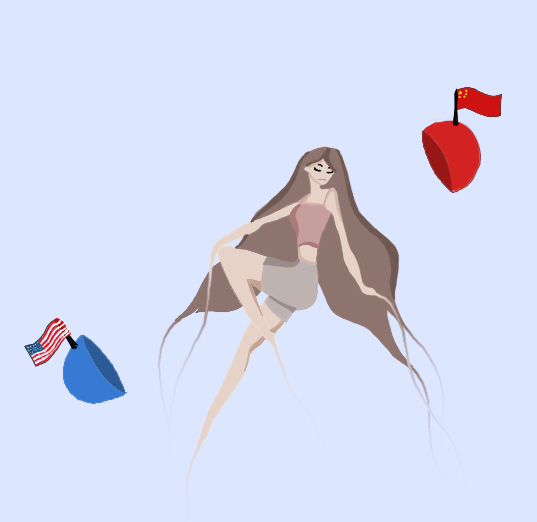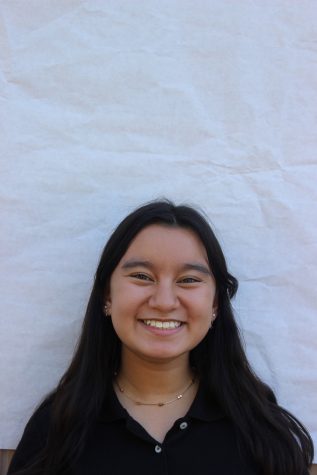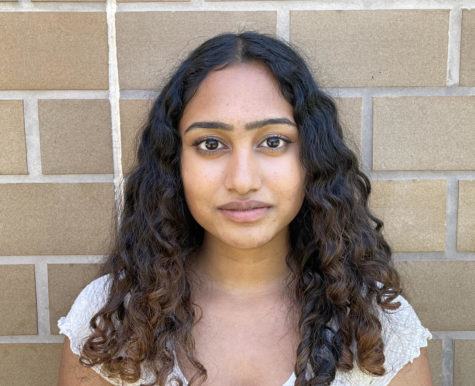Continuing the Conversation: …to floating between identities…

Being biracial isn’t always as great as it seems. Most of the time, it’s an ongoing identity crisis where you’re stuck floating between identities.
October 27, 2020
As a current high school senior, I’ve since begun the arduous process of filling out college applications. Perhaps one of the most difficult questions for me to answer isn’t a writing prompt, but rather “Which of the following groups best describes your racial background? Check all that apply.”
With the ever-so present topic of affirmative action, I wondered which racial background would give me the most advantage for admission. A very shallow thought I’ll admit, but anything for a college education to boost one’s socioeconomic status, right?
Judging by name, you can’t tell that I’m in any way Chinese, so I could get away with marking only “White.” However, minority points do come into play and besides, I’m more connected with my Chinese side, so I might as well mark only “Asian.” After some Googling and Reddit college thread stalking, I still didn’t find the answer to: What race should biracial people put down on college applications?
To any biracial people struggling through the college application process right now, here’s my answer as someone who’s stuck right in the middle (50% Chinese, 50% White): Put what makes you feel most like yourself. With that said, I ended up checking multiple boxes on my applications, but only after hours of thought — and that’s where the issue lies.
Being biracial my entire life, I never questioned my identity before high school. For me personally, and I hope you can relate, when I was young, I never questioned whether I fit in. My parents were all I needed and I simply was myself, no labels attached. As I got older, I became more aware of my surroundings and started paying attention to my own identity and the identities of others. I started seeking a sense of belonging.
However, as someone who can’t confine their identity into just one checkbox, I don’t belong anywhere. As a result, I question my identity every time I fill out a form asking for my race, among other situations.
The biggest misconception people have about biraciality is that it’s always peachy because you always get the best of both worlds. Don’t get me wrong, I love being able to celebrate both Chinese New Year and Hanukkah each year, but they don’t happen every day.
On holidays, I gather with friends and family — people who see me as myself. In those cases, I’m not too Chinese to be White or too White to be Chinese. I’m me.
On every other day of the year (not limited to just holidays, but I hope you’ve caught onto my metaphor by now), I feel like an outsider in the eyes of society.
I don’t belong to either group I identify as, but rather I float between identities and I’m stuck in that divide. I can’t flip my identity like an on/off switch. I can’t say “Oh, I feel more Chinese today, so I’ll just float over to this group.” They wouldn’t fully take me in anyways.
Whenever I’m around native Chinese people who don’t know me or my family, they view me as a foreigner and are pleasantly shocked every time I open my mouth to let out my fluent Mandarin-speaking ability. I have vivid memories of my mom explaining my identity to her peers, a step that non-mixed people don’t have to take.
As for when I’m around groups of White people, I feel myself sticking out like a sore thumb, exposing myself to judgmental stares.
The assumptions don’t stop there. Last year during my calculus class, a couple of AP Statistics students came in to do a survey one day. The first question asked for my race, but the only options were “Asian” and “Other” and the directions said to “check one box only.” I ended up not filling out a survey because I couldn’t honestly answer the question, which resulted in me questioning my identity for the rest of the class period. Having an identity crisis while learning about integrals is an experience that I’ll never forget.
Biracial people just want to be accepted by society like how a non-mixed person is. While not all of us face blatant racism and discrimination, our place in society is rarely acknowledged. It’s exhausting to have to constantly question the validity of our identity. When people look at us, they immediately want to fit us into one checkbox and they do so by asking the infamous “What are you?” Well, I am like you, a human.
Personally, I don’t even hear that question all that much. Most people just assume that I’m either Filipino or Mexican given my somewhat tan complexion. Then, once I tell them that I’m actually Wasian, they reply “Woah that’s so cool!” There’s nothing cool about my identity being erased in the eyes of society.
Sorry, that last line was pretty bitter but I promise it’s purely for emphasis. People apologize when I bring up this misconception, but it’s not their fault that they falsely assumed my racial background. We make false assumptions all time, and more often than not, it’s a result of how society has trained us to think.
Things are definitely getting better though as there have been a few people to accurately guess my racial background upon first meeting me, meaning that we’re becoming more accepting of the fact that racial combinations exist. Small things like “Check all that apply” are a great start to recognizing the existence of biracial people.
To sum up, being biracial is awesome. I love who I am and I embrace both sides of myself. All I ask is that both sides embrace me (and everyone else who feels the need to squeeze my identity into one checkbox). To my fellow mixed people, solidify yourself in your identity and embrace every aspect of it; mark every single checkbox if you need to.
Until next time, your friend,
Caroline Lobel


